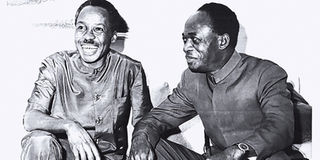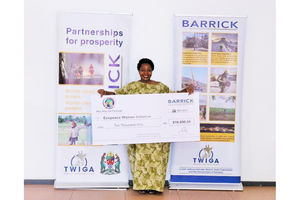The dearth of ‘wise leadership’

Solely missed. With the rise of corrupt and heavy-handed regimes over the years, Africa bleeds due to the lack of selfless leadership spearheaded by African visionaries like Tanzania’s Mwalimu Julius Nyerere and Ghana’s Kwame Nkrumah. PHOTO|FILE
What you need to know:
- The Index also shows some more disappointing results. The average score for the continent on government accountability is 35 per cent. On how satisfied citizens are with their governments’ anti-corruption efforts, 36.3 per cent.
Dar es Salaam. While the quality of governance in Africa has slightly improved over the last 10 years, the state of corruption has worsened over the same period. The Mo Ibrahim Foundation’s Index on African Governance launched recently shows that since 2006, 33 out of 54 African countries deteriorated in the amount of red tape and corruption in government.
The Index also shows some more disappointing results. The average score for the continent on government accountability is 35 per cent. On how satisfied citizens are with their governments’ anti-corruption efforts, 36.3 per cent.
These findings agree with Transparency International’s research on Africa.
Speaking at the launch, Dr Mo Ibrahim cautioned that while African governance registered improvements in some areas, “… the decline in safety and rule of law is the biggest issue facing the continent today.” He adds that “Sound governance and wise leadership are fundamental to tackling this challenge.”
But what would “wise leadership” look like, and how could it be delivered within the term of a presidency? Perhaps the best advice would come from people who have held that office and received recognition for exceptional leadership.
Ten years ago, Mo Ibrahim set up a very large prize for African Heads of State that leave office after serving with excellence. They would have to have been democratically elected, and demonstrated exceptional leadership within the limits of their constitutionally mandated term of office. Over the last 10 years, only five African Presidents have won this annual prize, including Nelson Mandela as honorary winner.
Esteemed prize committee
Despite this being an annual award, in 2009, 2010, 2012, 2013 and 2015, the esteemed Prize Committee, after in-depth review, could not find a winner.
Moving forward, supposing one of the next winners of the Ibrahim prize decided to substantially influence African governance through direct investment in the hottest spots of African leadership.
By winning, they will be joining a currently very short list of exceptional leaders that have been recognised for having beaten all odds to advance the quality of life of their people.
What these exceptional leaders have in common makes them an immensely valuable African resource. With the recognition among peers, the prestige that comes with this award, the wealth of their collective experience, the diversity of their credentials, there is a lot to gain if one of them were to mobilise this resource collectively.
Running an African country is clearly a tough job. While all African heads of state have long lists of presidential advisors, on some matters, consultation with those who have actually walked a mile in their shoes offers a unique and very helpful perspective.
Be it on issues of balancing political pluralism in a post-revolutionary context, decisiveness on the question of corruption, or related issues.
Having successfully delivered within limited terms of office, the award winners could also advise on the issue of term-limits and succession. Many of our African leaders are challenged with the limitation on their time in office.
How can they deliver all their good ideas and heartfelt contribution for their people in just two short terms of office? President Mugabe painted a good picture of this, telling the African Union that “two terms could feel as short as two weeks.”
The Ibrahim Award winners will all already have left office. How did they deliver so well within such limited time? One could argue that it is actually a mark of leadership-excellence for one to lead in such a way as to leave. To be comfortable enough to leave because they leave behind a great legacy.
In financial terms, the winner will receive what is currently considered the world’s most valuable individual prize, earning him or her $ 5m over the next 10 years and an additional $200,000 a year for life. A large windfall, and which will run for the rest of their life.
At the very least, this might suggest that they may be in position to turn up for consultation where an African leader requests their support.
With such unique investment in African leadership, and with consistent commitments in the areas of personal safety and anti-corruption, the next decade will see leaps in progress in African governance.
Mr Banoba is Africa Regional Advisor at Transparency International. Email: [email protected]



